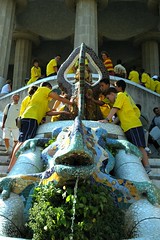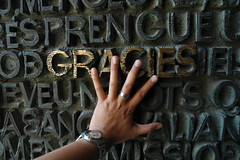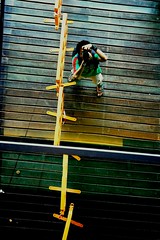Atonement isn't about atoning at all
I was fortunate today: a friend of mine (who works not far from where I work) had a couple of tickets to Atonement last night. She wasn't able to make it: her boyfriend had free tickets to something with Hossan Leong in it and both mutually forgot to inform the other. She decided to give up Atonement for Hossan Leong, and I got myself 2 free tickets to an Oscar-winner-to-be.
My own date's version of events is that the Hossan Leong show costed more, and therefore, in pure economic terms, giving up Atonement was a far better deal. Upon learning about Hossan Leong though, I told my friend that it was far more prudent to give up Hossan Leong instead.
Like she would. :)
And anyhow, I think I would have enjoyed Atonement alot more - why would I blog about it, no less?
Ed note: before proceeding further, there're going to be a whole lot of spoilers (from my POV at least), so read on only after you've either read the book, or seen the movie.
---------------------
When I read Atonement a few years back, it struck me that I had probably just read the best book of my life (I think I've scaled higher peaks in literature since then, but alas, I've recently regressed a far lot further since). Atonement was, for me, a writer's novel. It takes someone who's read well and read a lot to empathise with the protagonist, and, by extension, with the author himself.
The movie as I saw it yesterday night (this being only a few hours ago) was faithful to the novel - this must be because Ian McEwan himself was a producer on the movie. The movie neatly segments into four parts, just as in the novel itself:
- there was the story of that one fateful day where Briony saw her sister jump into the fountain before the manservant Robbie, and the tragic misunderstanding borne of an overactive imagination;
- there was the horror of war and what it wrought on the young men of a generation, the story of Robbie and his promise, the promise to return to the woman he loves;
- there was the story of Briony and her atonement, and how she slowly understood what she had wrought. There was her experience as a wartime nurse and her wanting to tell the story that is consuming her;
- there was the story of the aged writer, Briony finally realizing the story, her last, and what it meant to tell a story itself.
Ultimately, the story that is told in Atonement is not about Robbie and Cecilia, though one will think it is, given that they get all the coverage. The story is also not about Briony: it is, cleverly hidden from the reader / viewer who the person pulling the strings was, and the smart reader / viewer will have already discerned, early on, that the writer was telling the tale, and the writer is Briony.
But... be a little patient, and listen carefully when Briony makes her soliloquy (in the novel, this was all in Briony's head; in the movie, it came out cleverly as an interview). What Briony was essentially talking about was about storytelling, and there were a few themes in there which made the book more than just another frame story (a mise en abyme), and which made this the Booker prize winner. The truth of the matter is this: I believe Briony, in this last part of the story, is actually Ian McEwan talking about himself; and particularly, himself as a storyteller and what it meant.
I remember reading the story so many years ago, and it still struck me how, in this last part of the book, everything that was fabricated earlier was an exposition in the struggles of a storyteller: telling it as it was (fact) or telling it for what it is meant to be (fiction); imagination and the dangerous course it sometimes runs; one's experiences in life, and how they come to be important in shaping the story; and what it means to set things right, even if they were never to be achieved in reality.
---------------------
I felt for the characters: I truly did. It hurt to be wronged, disgraced and shamed; and set in an English class struggle it is all the more tragic what Robbie himself went through. It hurt to be separated from your love, and the pain of separation which drove Cecilia to part from her family, distraught and angry with your kin, is one that is beyond bearing. It must have been distressing to be Briony, to realise that you have wronged someone, and was ultimately the cause for the suffering and hurt to, not just our two protagonists, but, to a whole family as well. Briony realised that her actions of that evening was the cause of it all (like the first domino in a long chain of tragic events).
I felt it must have been carthatic to write about it all, and seek release - and I smiled when she talked about the happy ending that she wrote. An irony at the end: the truth is tragic, and the novel would have had closure the way it was without the fourth and final part of it. But that was Briony's closure, not ours, and Ian McEwan recognised that the novel wasn't great until he tore away the veneer of falsehood over it and pulled away the wool that covered our eyes all along.
That made the novel a masterpiece - and I can think of no better compliment than that for a writer.















